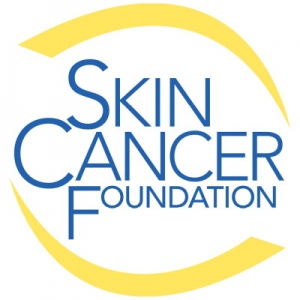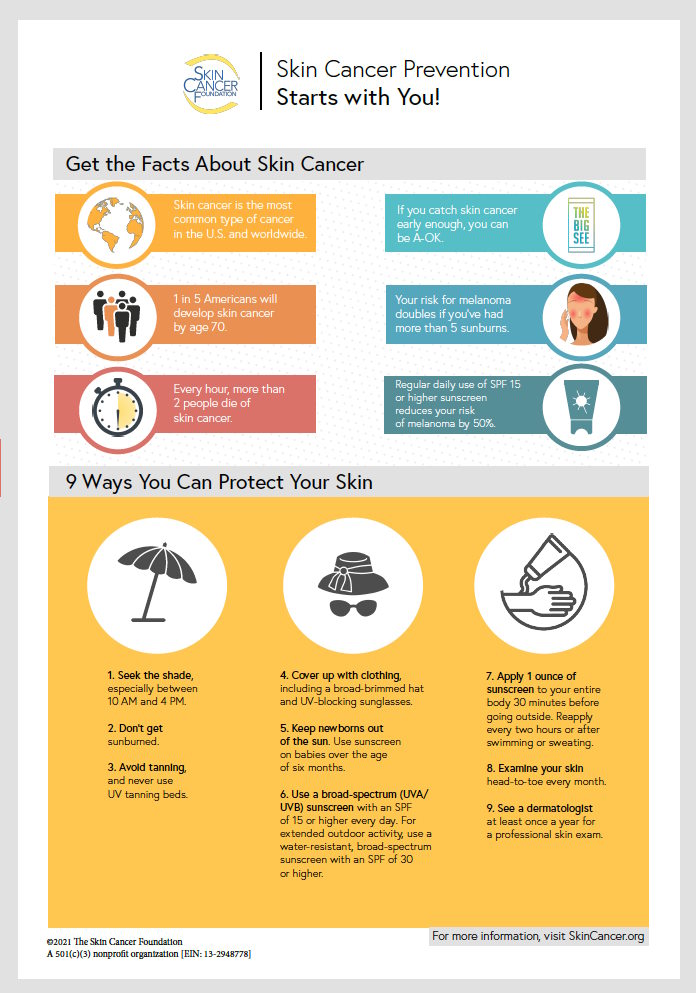Skin Cancer Awareness Month – May 2023
 May is the annual ‘Skin Cancer Awareness Month’, organised by the American Skin Cancer Foundation.
May is the annual ‘Skin Cancer Awareness Month’, organised by the American Skin Cancer Foundation.
The objective of the campaign is to raise awareness and understanding of how to prevent, detect and treat skin cancer.
Key facts about skin cancer
- 1 in 5 Americans will develop skin cancer by the age of 70.
- More than 2 people die of skin cancer in the U.S. every hour.
- Having 5 or more sunburns doubles your risk for melanoma.
- When detected early, the 5-year survival rate for melanoma is 99%.
Skin cancer is in many cases preventable, as 90% of non melanoma and 85% of melanoma cases are associated with sun exposure. Skin cancer related to sun exposure could be prevented with better sun protection and avoidance practices.
Early detection is vital, as skin cancer is highly treatable if it is tackled early. This is why it is vitally important to raise awareness of the issue, so that people seek early diagnosis and treatment. When left untreated, skin cancer can spread and become a lot more difficult to treat. The chances of a successful outcome unfortunately decrease. It is potentially fatal, so any concerns should always be taken seriously.
Skin Cancer Infographic
The Skin Cancer Foundation have produced an infographic to communicate more visually:

1/ Preventing skin cancer
- Regular daily use of an SPF 15 or higher sunscreen reduces the risk of developing squamous cell carcinoma by about 40% and reduces the risk of developing melanoma by 50%. Experts recommend using SPF 50+ every day of the year
- Seek the shade especially between 11am-3pm
- Avoid tanning and sunburn
- Never use UV tanning beds
- Cover up with clothing, wide-brimmed hat and UV blocking sunglasses
- Ensure you’ve used plenty of sunscreen and reapply frequently, especially after swimming or when sweating
2/ Detecting skin cancer
- Vigilance is more important than ever and everyone is encouraged to self-check and be aware of the signs
- Examine your skin head to toe every month, looking for unusual blemishes, moles or skin lesions. In particular, check for:
- Asymmetry in the shape of the mole
- Borders that are uneven or notched
- Coloration that is unusual in tone or patchy
- Diameter that is larger than the eraser on a pencil
- Evolving moles that change colour or size
- If you have any of the above or moles that behave in odd ways such as oozing/itching/bleeding, then see a GP as soon as possible for assessment. If they agree that your mole needs investigating, you’ll be referred to an NHS specialist for further assessment
3/ Treating skin cancer
- If your diagnosis points to skin cancer, NHS treatment is provided free of charge
- Treatment usually starts with removal of the skin cancer(s) and then biopsy/testing to assess them. In many cases, removal of the cancerous lesions resolves the problem and no further treatment is required. In some cases, there may need to be further procedures or treatments.
- The best outcomes are where the cancers are caught early. That’s why it is important to check the skin regularly and seek attention in case of any concerns
If your mole or lesion is deemed not to be cancerous or of any medical risk, in these cases the NHS no longer provide ‘cosmetic’ mole removal.
Do the #SkinCheckChallenge™
Skin Cancer Awareness Month
The American Skin Cancer Foundation are promoting the #SkinCheckChallenge for Skin Cancer Awareness Month:
- First, check your skin from head to toe. Look for anything new, changing or unusual.
- Post a photo or video of your skin check and share it online with the hashtag #SkinCheckChallenge.
- Share a “thumbs up” pic or get creative! Tag and tell if you found anything.
- Finally, invite two friends to do it too.
Private Mole Checks & Removal
The London Mole Removal Centre is a private company, offering private mole checks and mole removal treatment for unwanted moles. The experienced doctors and surgeons also offer removal treatment for a range of other skin lesions (e.g. cysts, skin tags, warts, verruca, lipoma, xanthelasma).
All consultations and treatments are carried out in person by doctors who are specially trained in the latest laser and skin surgery techniques and are highly experienced in the field.
Further advantages of private treatment at the London Mole Removal Centre include:
- No waiting lists
- Fully trained doctors, registered with GMC
- Moles can often be removed in the same appointment as the consultation, saving the need for a repeat visit and allowing patients to get their skin lesions removed very quickly
- Choice of 4 clinics in London plus one in Bristol
- Removed moles tested with report provided
For more information or to book a consultation, please complete the form on this web page or call 020 7731 3791.


